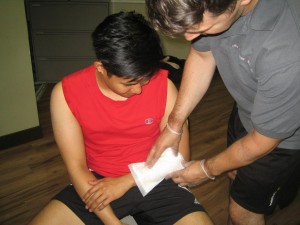Many individuals end up with mild reactions to insect stings, but some can experience severe allergic reactions that entail immediate medical attention. It is important to note that some insects carry diseases such as encephalitis or West Nile virus but this is rare.
Insect stings or bites that instigate severe pain and swelling at the bite site, swelling of the face, generalized rash or difficulty breathing would require medical attention.
If an individual has been stung by an insect such as a bee, there are steps that you should perform:
- Remove the stinger. All you have to do is flick out or scrape it with a stiff object such as a credit card or grasp it with tweezers and pull straight out in order to avoid squeezing in more venom into the wound.
- Cleanse the wound with water and soap
- Apply a cold compress or ice pack to help minimize any swelling and relieve the pain
- Monitor for any signs of severe allergic reaction
In case an insect sting or bite wound lingers or becomes worse over several days, it is vital to seek medical treatment for possible infection. Seek immediate medical care if the individual has been bitten or stung and shows signs of a severe allergic reaction or anaphylaxis.

Symptoms of an allergic reaction
- Hives, rash or itching at the site of bite or sting or on a different part of the body
- Swelling of the throat
- Swollen eyelids or lips
- Difficulty breathing or wheezing
- Loss of consciousness
Steps to minimize the risk for insect stings and bites
- Use an insect repellant especially those that contain DEET. These are highly effective in preventing bites by ticks, mosquitoes, fleas, chiggers and biting flies. Repellants used for children must not contain more than 10% DEET. Avoid using unscented soaps, hair sprays, perfumes or sunscreens that will only attract the insects.
- Avoid going outdoors during the peak hours when insects are out, particularly dusk and dawn.
- Try to steer clear of areas where insects are likely to gather or nest such as garbage bins, stagnant sources of water, gardens and plantations where flowers are in bloom.
- While staying outdoors in wooded, grassy or floral areas as well as those infested with mosquitoes or ticks, it is recommended to wear long-sleeved blouses and pants as well as protective shoes. If possible, dress in light-colored clothing and avoid bright colors or flowery prints that will attract insects. In addition, do not wear baggy clothes that will only trap insects.
- Do not leave beverages, food or garbage out and uncovered.
- Adults and children who are highly allergic must wear medical identification bracelets and adrenaline auto-injectors must be available at all times.
- Carefully inspect the body for ticks after passing through pest-ridden areas. In case a tick is present and know the steps to remove it, perform the removal right away.
- If a tick was properly removed, you have to closely monitor the area and observe for indications of Lyme disease or Rocky Mountain spotted fever. Do not hesitate to call a doctor if symptoms are present.
